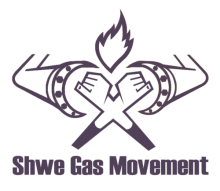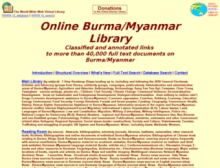Resource information
Executive Summary"
"A scramble for natural gas presently unfolding in western Burma is poised to provide the ruling military junta with its single largest source of income. The sale of the gas, mainly to regional neighbours, will further entrench the junta, insulating it from international pressure. The country's already abysmal human rights situation is set to worsen.
A consortium of Indian and Korean corporations, in cooperation with the regime, has been exploring gas fields off the coast of Arakan State after the discovery of a "world class gas deposit" in wells labelled "Shwe" (the Burmese word for gold) in late 2003. The Shwe wells are expected to lead to one of the largest gas yields in Southeast Asia. Burma's strategic location between two of the world's largest and most energy-hungry countries (China and India) has accelerated the exploration and extraction process.
Outcry over Burma's human rights record and its continued detention of democracy leader and Nobel Peace Prize laureate Aung San Suu Kyi has led to a series of actions by the international community, including moves to highlight Burma as a security threat at the UN Security Council. Yet the regime has continued its military expansion and offensives, particularly into ethnic border areas, in an effort to strengthen its hold. Since 1988, the number of infantry battalions based in the Western Command in Arakan and Chin states, the two western states that will be affected by the Shwe gas project, has increased from 3 to 43 battalions.
The increased militarization has led to human rights abuses including forced labour, confiscation of land and assets, extortion,
and violence. These abuses will surely be exacerbated by a further increase of troop levels to secure any gas pipeline in the area. Indeed, the effects of the project are already being felt by local fishermen. In April 2004, soldiers arrested fishermen inside an exclusion zone around exploratory rigs in the gas fields. The men were not aware of the restrictions as they had frequently gone fishing in that area. Regardless of this, they were beaten and thrown injail.
Gas from the Yadana and Yetagun pipelines in the east of the country is currently Burma's largest source of legal export revenue. The Shwe project, however, would increase the junta's income from gas by at least 150%. The junta stands to profit by approximately US$580-824 million per year or US$124 7 billion over the life of the project. Previous gas earnings have been directly linked with military arms purchases and allow the regime to continue its oppressive grip on the whole of Burma's population in defiance of international pressure.
While the regime purchases more arms with gas revenues, the local population remains in poverty. Arakan and Chin states are both excluded from the national electricity grid; ninety percent of the population uses candles for light and firewood as their primary source of cooking fuel. People are denied their rights to participate in decision-making about any development projects, including the extraction of local resources.
Two proposed pipeline routes to India traverse four areas classified as crucial to the conservation of global biodiversity, including one of the ten most vulnerable ecoregions in the world. Clearance paths either side of a pipeline that would disrupt animal migratory paths and the building of roads and infrastructure are ⢠foreign governments, institutions, and civil society,
of particular concern in these areas. The fate of at least three particularly in the region, to pressure businesses
critically endangered animal species, the Arakan forest turtle, involved in the Shwe gas project to freeze all current
the dugong, and the Irrawaddy river dolphin, will also be put into business with the military regime and refrain from
question by the Shwe project. Environmental dangers involved further investment.
in the commercial production and transport of natural gas such
as chemical leakage and gas blowouts are a further concern. ⢠the broader international community to continue to
expose the dangers posed by the Shwe gas project. Several ancient historical sites - including the third Dhanyawaddy City that dates back to 580 BC - that are significant not only to Arakan people but to the understanding of the history of Southeast Asia lie within twenty kilometres of the proposed Shwe gas pipelines. Given the SPDC's record of destruction and disregard for culturally and historically important sites, including those in Arakan State, this proximity makes them vulnerable to ransacking and destruction during the development of the Shwe pipelines and associated infrastructure such as roads and military barracks.
In order to address the potential social, economic, and environmental impacts of the Shwe gas project and to enable its benefits to be distributed equitably, Burma needs a democratic system of governance in which people can voice their concerns without fearing persecution. Without this, the Shwe project must not go forward.
The Shwe Gas Movement urges:
⢠all corporations and businesses involved in the Shwe project, either state or privately owned, to freeze all current business with the military regime and refrain from further investment and exploration until a dialogue can be held with a democratically-elected government.



